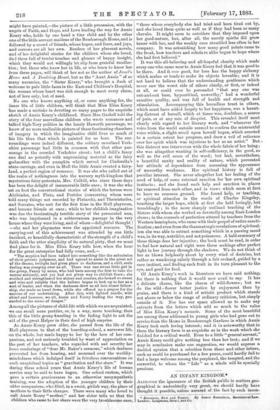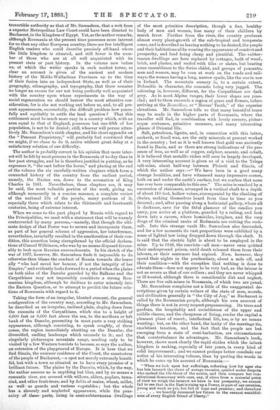AN INFANT KINGDOM.*
ALTUOUGH the ignorance of the British public in matters geo- graphical is undoubtedly very great, we should hardly have thought it possible, unless assured of the fact by such incon-
• Roumania, Past end Present. By James Samuelson, Barrister-atstw. London : Unmans, Green. and Co.
trovertible authority as that of Mr. Samuelson, that a writ from a superior Metropolitan Law Court could have been directed to Bucharest, in theKingdem of Egypt. Yet, as the author remarks, although Roumania at the present time possesses more interest for us than any other European country, there are few intelligent English readers who could describe precisely off-hand where the little kingdom is situated, and still fewer is the num- ber of those who are at all well acquainted with its present state or past history. In the volume now before us,- of which the writer speaks in such modest terms, so clear an account is given of the ancient and modern history of the Moldo-Wallachian Provinces up to the time of their fusion into an independent State, as well as of their geography, ethnography, and topography, that there remains no longer an excuse for our not being perfectly well acquainted with the country upon whose experiments in the way of social regeneration we should bestow the most attentive con- sideration, for is she not working out before us, and, to all pre- sent appearances, successfully, the difficult problem how peace- fully and equitably to settle the land question P That this settlement must be much more easy in a country which, with an area equal to that of England, possesses but one-fifth of her population, is not to be denied ; still, whoever will peruse atten- tively Mr. Samuelson's sixth chapter, and his short appendix on the "Peasant Proprietary," will probably feel convinced that we might, if we chose to do it, arrive without great delay at a satisfactory solution of our difficulty.
The author is probably correct in his opinion that more inter- est will be felt by most persons in the Roumania of to-day than in her past struggles, and he is therefore justified in putting, as he expresses it, "the cart before the horse," and placing at the end of the volume the six carefully-written chapters which form a connected history of the country from the earliest period, namely, the Dacian era, down to the coronation of King Charles in 1881. Nevertheless, these chapters are, it may be said, the most valuable portion of the work, giving us, although necessarily in a concise manner, a complete review of the national life of the people, many portions of it, especially those which relate to the thirteenth and fourteenth centuries, being of extreme interest.
When we come to the part played by Russia with regard to the Principalities, we meet with a statement that will be warmly controverted by many persons,—namely, that though the ulti- mate design of that Power was to secure and incorporate them, as part of her general scheme of aggression, her interference, nevertheless, invariably resulted in the amelioration of their con- dition, this assertion being strengthened by the official declara- tions of Consul Wilkinson, who was by no means disposed favour- ably to look upon Russian encroachments. In his sketch of the war of 1877, however, Mr. Samuelson finds it impossible to do otherwise than blame the conduct of Russia towards the brave ally "who had saved her honour, if not the integrity of her Empire;" and evidently looks forward to a period when the plains on both sides of the Danube guarded by the Balkans and the Carpathians may not impossibly constitute a strong Rou- manian kingdom, although he declines to enter minutely into the Eastern Question, or to attempt to predict the future rela- tions of Roumania with regard to it.
Taking the form of an irregular, blunted crescent, the general configuration of the country may, according to Mr. Samuelson, be described as an irregular, inclined plain, sloping down from the summits of the Carpathians, which rise to a height of 6,000 feet or 9,000 feet above the sea, to the northern or left bank of the Danube, presenting in most parts a very striking appearance, although consisting, to speak roughly, of three zones, the region immediately abutting on the Danube; the diversified, smiling landscape which succeeds to it ; and the singularly picturesque mountain range, needing only to be visited by a few Western tourists to become, so says the author, an extension of the playground of Europe. It is here that we find Sinaia, the summer residence of the Court, the sanatorium of the people of Bucharest,—a spot not merely extremely beauti- ful, but with a town so situated as to have every promise of a brilliant future. The plains by the Danube, which, by the way, the author assures us is anything but blue, and by no means a romantic river, are covered with willows, alders, poplars, tama- rind, and other fruit-trees, and by fields of maize, wheat, millet, as well as gourds and various vegetables ; but the whole has a slovenly and neglected appearance, while the peas- antry of these parts, living in semi-subterranean dwellings of the most primitive description, though a fine, healthy body of men and women, lose many of their children by marsh fever. Further from the river, the country produces almost every plant-growth of the sub-tropical and temperate-. zones, and is described as leaving nothing to be desired, the people and their habitations alike wearing the appearance of comfort an& prosperity, and food being cheap and plentiful. The subter- ranean dwellings are here replaced by cottages, built of wood,. brick, and plaster, and roofed with tiles or slates, but bearing.
some resemblance to the Swiss chalet, and groups of peasants,. men and women, may be seen at work on the roads and rail- ways, the women having a long, narrow spade, like the one in use in Ireland. The mountain scenery is, to a certain extent,. Dolomitic in character, the summits being very jagged. The colouring is, however, different, for the Carpathians are dark grey. As in most Alpine ranges, their lower slopes are pine. clad ; and to them succeeds a region of grass and flowers, before- arriving at the R,osszahne, or "Horses' Teeth," of the superior elevations. Mr. Samuelson tells us that many beautiful tours may be made in the higher parts of Roumania, where the . traveller will find, in combination with lovely scenery, pictur- esque costumes, primitive manners, and many interesting phases of Oriental life.
Salt, petroleum, lignite, and, in connection with this latter, ozokerit, or fossil wax, are the only minerals at present worked in the country ; but as it is well known that gold was anciently found in Dacia, and as there are strong indications of the pre- sence o iron, as well as of copper, sulphur, arsenic, and cobalt, it is believed that metallic riches will soon be largely developed. A very interesting account is given us of a visit to the Telega salt-mine, about half-way between Ploiesti and Sinaia, of which the author says :—" We have been in a good many strange localities, and have witnessed many impressive scenes, both on and under the earth's surface, but we confess that none has ever been comparable to this one." The mine is reached by a. succession of staircases, arranged in a vertical shaft to a depth of about 110 feet, hollow voices,abcompanied by the clanking of chains, making themselves heard from time to time as your descend ; and, after passing along a horizontal gallery, where all is darkness, save for the fitful glamour of the candles you carry, you arrive at a platform, guarded by a railing, and look down into a cavern, where homicides, burglars, and the very dregs of the criminal ranks of Rodmania are cutting the rock- salt. Into this strange vault Mr. Samuelson also descended, and for a few moments its vast proportions were exhibited by a mass of lighted tow being dropped down through the shaft. It
is said that the electric light is about to be employed in the mine. Up to 1848, the convicts—all men—never once quitted their underground prison, until death released them from their labours, or their sentences had expired. Now, however, they- spend their nights in the penitentiary, about a mile off,- and their condition—with the exception that nothing is done to educate them—does not appear to be very bad, as the labour is not as severe as that of our colliers ; and they are never whipped or ill-treated, although there is considerable dirt and neglect. There are five salt-mines in Roumania, of which two are penal..
Mr. Samuelson complains not a little of the exaggerated de. scriptions given by certain writers of the state of men, morals,. and civilization generally in "the City of Joy," as Bucharest is called by the Roumanian people, although his own account of things there is not in every respect prepossessing. Its trees and gardens, the hospitality and sociableness of the upper and middle classes, and the cheapness of living, render the capital a pleasant place of resort ; intellectual life, too, is by no means wanting ; but, on the other hand, the laxity of the marriage tie, exorbitant taxation, and the fact that the people are but emerging from a state of semi-barbarism, are circumstances that counterbalance its advantages. Mr. Samuelson's book, however, shows most clearly the rapid strides which the infant. kingdom is making, especially of late years, in every kind of solid improvement ; and we cannot perhaps better conclude our notice of his interesting volume, than by quoting the words in which he sums up his account of Roumania :—
"When we look upon her sufferings, reflecting how for ages she has lain beneath the claws of savage enemies, quailed under despots who sucked the life-blood of the nation, and then compare her con- stitutional democracy with ours, nay, if alone from a material point of view we weigh the interest we have in her prosperity, we cannot fail to see that in the East is rising up a Power, in part of our creation, young and weak as yet, but full of hope and promise; and therefore we heartily commend her future to the earnest watchful- ness of every English friend of liberty."















































 Previous page
Previous page